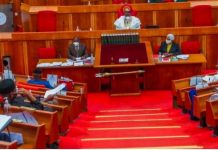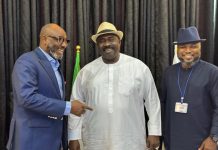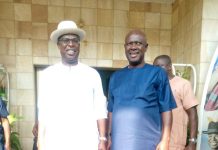Vice President Kashim Shettima has called for the prioritisation of local content and promotion of made-in-Nigeria products, citing that Executive Order 003 which makes the patronage of locally manufactured products mandatory is still in effect.
Shettima also says the Federal Government has partnered with the Manufacturers Association of Nigeria to devise an actionable roadmap and policy framework that would refurbish the nation’s manufacturing sector.
He affirmed that the roadmap and policy framework would be speedily implemented to effect the needed changes that will revamp the sector.
The VP, who declaring open the three-day National Manufacturing Policy Summit at the State House Banquet Hall regretted that the sector had endured a series of setbacks over the past decades.
“Distinguished ladies and gentlemen, I implore us all to leverage this summit to develop an actionable roadmap and policy framework, ready for immediate implementation, to create the changes we want in the manufacturing sector.
“I assure you that we shall always maintain an open-door policy to accommodate your needs and expectations,” Shettima stated.
The VP further stressed the need to support local firms.
He said, “Let us be reminded that we cannot achieve significant progress in our drive for industrialisation unless we deliberately promote the production of capital goods.
“We must be focused on expanding our production base, prioritizing local content, and promoting made-in-Nigeria products.”
“I want to assure you that Executive Order No 003 – Support for Local Content in Public Procurement by the Federal Government, which mandates the patronage of locally manufactured products is still in effect.
“The relevant government Ministries, Departments, and Agencies are mandated to fully comply with the order,” he declared.
Shettima observed that Nigeria has no better option than to support its indigenous firms to produce locally and increase their capabilities.m, especially as Africa has long languished at the bottom of the global value chain, with its share of global manufacturing at less than two percent.
The summit, according to him, offers the opportunity to re-evaluate the challenges confronting the sector and proffer solutions that would resolve them.
He noted that a competitive manufacturing sector would reduce the inequities in the nation’s economy as well as overdependence on imports.
“Our proposal to minimise the economic imbalances in the nation is based on strengthening the production base of our economy, particularly in manufacturing.
“Most of our setbacks as a nation, as each of you knows, are due to over-dependence on imports for even our basic necessities.
“That is why we need you to address the various challenges facing the sector and ensure we have a competitive manufacturing sector,” he added.
VP Shettima expressed satisfaction with what he saw during a tour of the exhibition, saying he is convinced more than ever of Nigeria’s industrial capabilities, creativity, and innovation.
The VP identified five pillars of the summit, which he said are a clear roadmap for stimulating the manufacturing sector, pointing out that it is imperative to enact meaningful change and develop industries by addressing critical issues under each of these pillars.
He listed them to include upscaling productivity and competitiveness, energy security and infrastructure development, improving the macroeconomic environment and ease of doing business, promoting Made-in-Nigeria products and local content development, and leveraging regional and continental trade for export development.
Earlier, President of MAN, Francis Meshioye, thanked participants for honouring the invitation after several postponements, just as he also expressed gratitude to President Tinubu, for the unique opportunity and his magnanimity to host the Summit in the State House.
Meshioye said the ultimate goal of the three-day meeting is to reposition the sector on the path of accelerated growth, enhance its competitiveness and reap its multiplier effect on the economy and the wellbeing of the citizenry.
Highlighting the problems diminishing growth in the sector, he stated, “the prevailing microeconomic environment places severe strains on the manufacturing sector,” adding that “this is adversely affecting jobs and people’s livelihoods of the citizens.”
Also, former Minister of Finance, Olusegun Aganga, urged the government to declare manufacturing a national priority sector.
He pointed out that the mere possession of natural resources does not guarantee national wealth.
“What makes a country rich is what it does with its resources,” Aganga said, calling for a shift from peasant farming to commercial agriculture and from artisanal mining to attracting major miners.
Aganga also recommended eliminating excessive customs duties, levies, and overlapping regulatory mandates to boost the manufacturing sector.
He said, “We also need to eliminate excessive custom duties, levies, regulars, and multiple regulators with overlapping mandates.”
Also present at the event were the Minister of Finance and Coordinating Minister for the Economy, Wale Edun; Director-General of National Agency for Food and Drug Administration and Control, Prof. Mojisola Adeyeye; Comptroller-General of Nigeria Customs Service, Bashir Adeniyi; Permanent Secretary in the Ministry of Industries, Trade and Investment, Nura Rimi; government appointees, senior manufacturing executives, and members of the diplomatic corps, among others.
PUNCHNG.COM





























